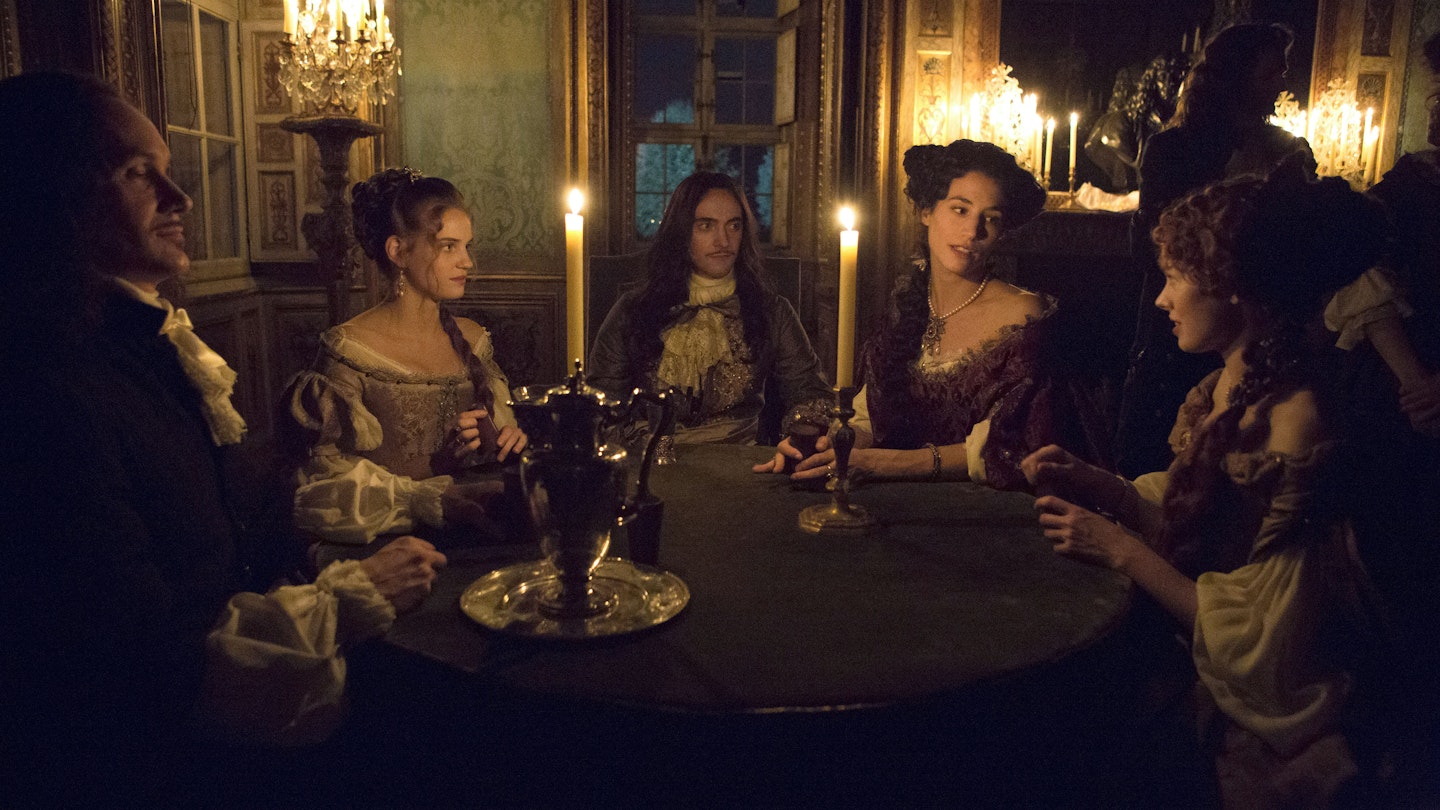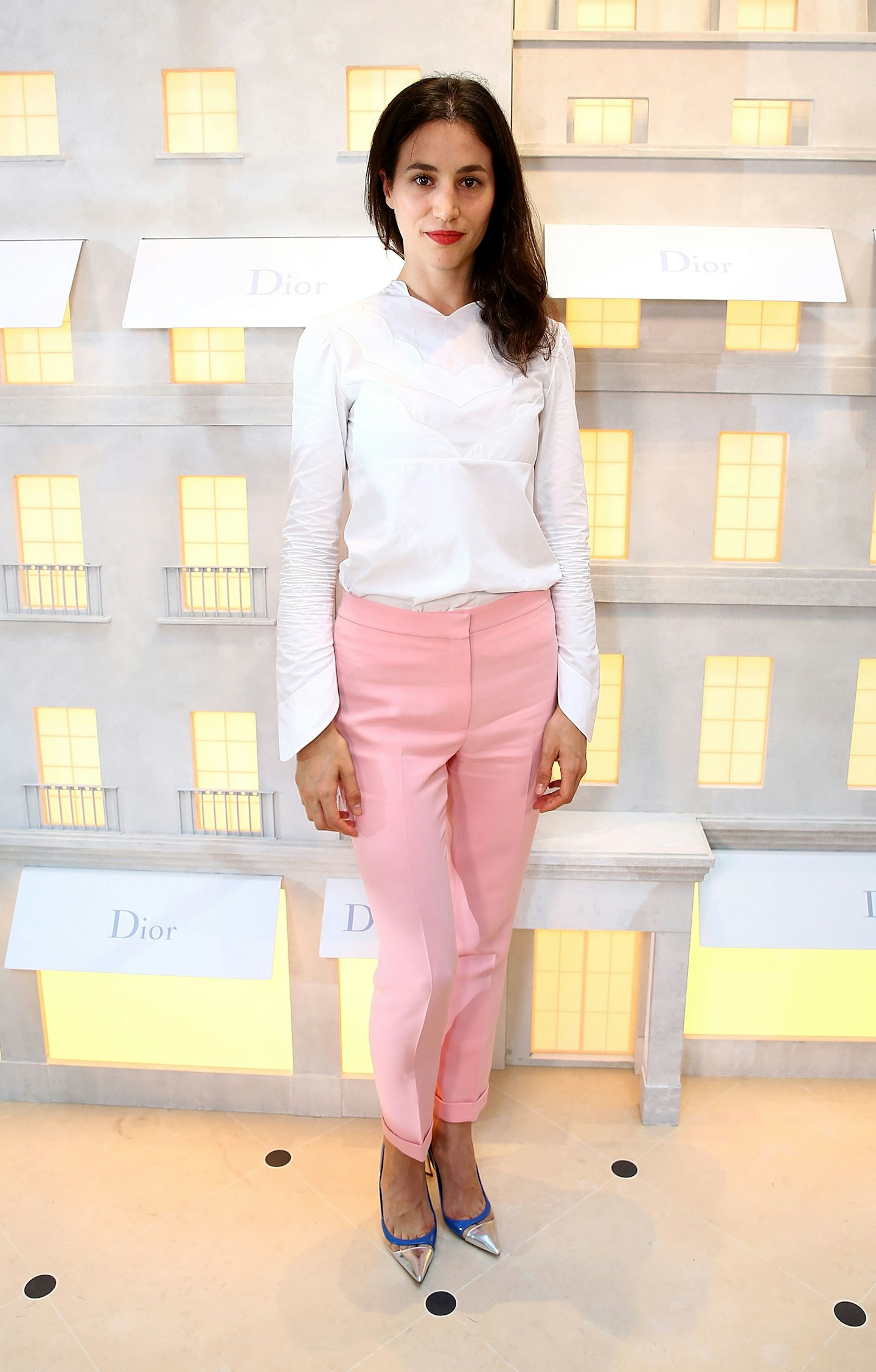BBC Two's Versailles, the lavish - and explicit - re-imagining of the reign of Louis XIV, has been one of the most talked-about television shows of the summer - with conversations (and headlines) predictably fixating upon the amount of violence (lots) and sex (lots and lots) seen on screen.
But for Elisa Lasowski, who plays the Sun King's put-upon wife Marie-Therese, the show's so-called 'shock value' is just plain old historical accuracy.
'It’s not any more violent or sexy than a lot of what’s on TV nowadays, so it doesn’t stand out in that way,' the actress, who has previously had roles in equally headline-grabbing shows like Game Of Thrones and Skins, and films including Shane Meadows' Somers Town. 'It's very much at the heart of the politics of the time.'
As the show's first season reaches a close - and with work already started on the second - we caught up with the actress to talk about corsets, potentially awkward on-set moments and what Versailles has in common with Keeping Up With The Kardashians...
Tell us about your character, Marie Therese
She was from Spanish royalty and married the king – marriages were all political alliances at the time. She was his cousin; they were all cousins in these incestuous European monarchies. When she came to court, she was quite isolated; she didn’t speak French very well, so the historians say, and held on to her culture. She had quite a hard life, having to live with all of Louis’ mistresses – it can’t have been easy to be a queen, or a woman in general at that point. We’ve evolved; we still have work to do, but we’re doing alright.
Did you know a lot about the period beforehand?
I’m French, but have a lot of different cultural influences in my background. I went to an international school in the Netherlands, so didn’t cover French history as such, but I did European history and obviously knew about that period of time. I did a lot more research once I got this, which I love doing; whatever part I get to play, I just think of it as an opportunity to learn about something new in depth. I read loads, and went to the British Library, which is a good working environment.
Does it feel strange to be playing a character who actually existed?
In a way, it’s a challenge because you are trying to stay true to what you’ve read and give an accurate account; on the other hand, it’s great to play someone who existed because there is so much material to dig up. Physically, we’re so different, though. She was blonde, had blue eyes, she was short… We have teeth; they had no teeth – that’s why they don’t smile in the portraits. Obviously there are big differences, and everything is a reinterpretation, but it’s a really good starting point and the scripts are obviously very well written; the show runners have a very accurate knowledge of the time.
What appealed to you about the script when you first saw it?
I get a feeling from the first half of the first page whether a script is good or not. There’s a really great flow in the scripts; with experience, you just sense it. What I thought was really great was how modern and contemporary it felt. I actually thought – and I think George [Blagden, who plays Louis XIV] thought so to – that we were going to be doing this like Baz Luhrmann did Romeo + Juliet, in jeans and t-shirts. There were so many little references to modern life in the script, like, ‘they’re looking at mirrors, the way kids would be looking at their phones.’ I really liked that about it – it means you can get into the period drama in a different way.
There are a lot of parallels with the twenty-first century, aren’t there?
Absolutely; and culturally, that period of history is where so much began – the French etiquette, the fashion. It’s so full of the beginnings of what our culture is now. The family machinations are very Kardashian…
Did the costumes take a lot of getting used to?
They were made to measure which was amazing, and made the corsets slightly more bearable – they’re modern alterations, but they’re still very heavy. Our costume designer is incredible; she’s got such a sense for colours, and the way she picked the fabrics for each character is sport on. In my costumes, there are a lot of burgundies, reds, heavy fabrics to signify royalty, and [Marie-Therese’s] Spanish heritage. It takes a bit of getting used to in the mornings – they’re quite tight…

How long did it take to get ready?
It takes two hours to get our hair, make-up and costumes ready. You’ve got a huge responsibility towards the costume; you’ve got to take care of it.
Did you find that you were carrying yourself differently?
I think the challenge of doing a period drama is not to suddenly stiffen. Just because you’re wearing a costume and a wig doesn’t mean you’d walk like a robot; yet there were certain etiquettes about how you’d stand, how you’d gesture, so we had a historical advisor to help us. With some of the costumes I have now, I can hardly raise my arms. You are restricted, so it does inform the way you move, yet at the same time we have to try and remain as loose as we can, so it doesn’t feel like the costumes are taking over from the acting.
You shot the show on location in France. What’s it like being surrounded by all that history?
It’s amazing. We’ve been filming in such beautiful castles; there’s one in particular called Vaux le Vicomte which I just absolutely adore, I think it’s everyone’s favourite. It’s a stunning castle, about an hour away from Paris, and Louis XIV was famously very jealous of its beauty. He got the owner imprisoned – he was his Minister of Finance, and found a way to nail him and get him out of the picture because he was so jealous of the location and the sumptuous parties they would have there. We do a lot of the big banquet scenes and interiors in there. It’s really just like being on a tour of French castles – it’s great.
How many did you visit?
There are about four or five different location that we use outside of Paris – for gardens, for banquets and balls – then there’s the studios, where they’ve recreated some interiors, and sometimes Versailles itself. The castle is being constructed in the story, so it’s not what it is today, but sometimes we film there on Mondays, when it’s closed to the public.

Which was your favourite scene to film?
That’s a hard one. There’s a seriousness about the queen, because of some of the things she goes through, and what she has to endure with her husband, but occasionally she gets a bit witty and a bit sharp. They’ve given her a few good lines where I was like, “Yes, that’s when I can get my revenge,” so I enjoy those. The birth scene was also amazing to do – royals gave birth in public for proof. It’s quite extraordinary to think that would’ve happened.
Was that awkward to film?
You just have to go for it when you do something like that. My director was like, “Remember, there was no anaesthetic – it would have hurt a lot.” I pulled a muscle in my neck while we were filming it, but it was quite fun to do.
Versailles has quite a young cast; did you have fun on set?
We do; we’re filming season two right now and we are having a lot of fun. It’s a lot of work, with long days and heavy costumes, so we’re very lucky because everyone is so friendly. I wouldn’t say that if it wasn’t true, but everyone’s so enthusiastic and supportive of each other, which is good because it isn’t always the case. Usually there’s someone with a bit of an ego, but that’s really not the case in our cast.
Why do you think this era still fascinates us today?
There are always different angles when you look back at history and tell a story in a new way, but when I initially read the script, it felt so contemporary. It’s fascinating to see the beginnings of modern politics, as well the etiquette, the fashion, ballet. You mentioned that we’re a very young cast, and there’s something fascinating about the fact that these people were very, very young. Louis was only 28 and had so much power, with all the craziness that youth brings.
Some people have criticised the sex and violence in the show – what’s your response to them?
It’s not any more violent or sexy than a lot of what’s on TV nowadays, so it doesn’t stand out in that way, but that’s not the point. If you look at what the sex is about, it’s also very much at the heart of the politics of the time. The fact that Louis XIV officialised his mistresses was just unbelievable – it was sacrilege in the eyes of France and of the Church, because the King was pretty much God’s second in line. The show is not about shock value – we’re just trying to create a world that’s accurate. It feels shocking now, but it was shocking then too.
Do you think it’s the case that TV offers better roles for women than film does now?
I don’t think that’s true. I think there’s great roles for women in film and on TV, and there are also very bad ones in film and TV. We still have work to do for equality, but it is progressing. Women’s roles are getting better, but I wouldn’t separate film and TV. In general, there are better roles now in TV for actors than there would have been a while ago – there’s so much more money in TV nowadays, and it’s respected in a way that it wasn’t before, so you can crossover. We still have progress to make – season two of Versailles is interesting because the female characters are very much taking over. We’re trying to give them a voice.
Versailles is available to own on Blu-Ray, DVD and digital download now here
READ MORE: Meet Sarah Winter, Star Of The BBC's Scandalous 'Versailles'
READ MORE: Stefanie Martini: The Breakout Star Of ITV's Doctor Thorne
